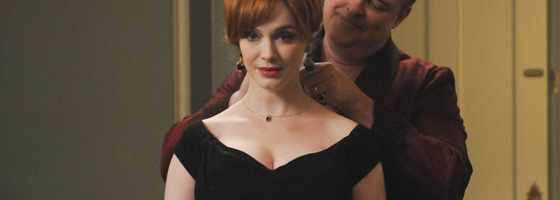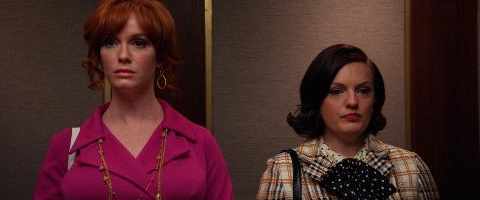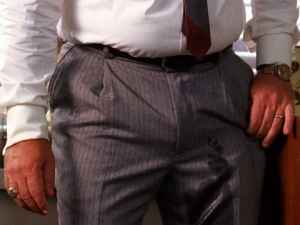Mad Men: Ways Chronology Plays a Crucial Part

After eight glorious and sumptuously detailed years, it’s almost upon us, a world without Mad Men. A world where we can no longer live vicariously through the alcohol and cigarette laden offices of Sterling Cooper (Draper, Pryce, Cutler, Gleeson and Chaugh, or the countless other monikers the office has adopted). A world where we no longer gain insight into the unique and retro lifestyle of the 60s which looks eminently cooler than our own. A world in which we are not only entertained, but also educated with one of the most stylish history lessons we’re ever likely to receive. But as Chaucer once said ‘All good things must come to an end’ and sadly that also applies to the Matthew Weiner penned Drama.
With the seven episode final stretch now under-way until the finale on May 17th, we take a look at how chronology plays a crucial part in three huge aspects of the show. From the more obvious ways a period show has to deal with time, to how it can distort a viewers consumption of the show and how that same concept can play into the characters hopes and disappointments.
A Lesson in Time
Mad Men has always been a show that likes to experiment with the expected template of a Television Drama series and nowhere is that more apparent with its approach to handling time. Unlike more conventional network dramas, Mad Men never placed much impetus on the need for cliffhanger television. It never concerned itself with storylines that would zig and zag for hours in order to secure a return-audience, in fact it was quite the opposite.
With no essential check-list for a standard episode, one entry into the back-catalogue could come off as a polar opposite to another. The show has always been described as something of a ‘slow-burn’, a phrase which many people would have been put off by in a time of action-packed television series like Lost and 24. But that tag has always been an unfair one. Dealing with inter-personal relationships and office politics like Mad Men does, the show was never going to get labelled as ‘edge of your seat’ television. But hours like season 3’s “Shut the Door. Have a Seat” and season 6’s “Favors” show that the series is impossible to pigeon-hole. These episodes displayed storytelling surprises at break-neck speed that would rival any plane crash or assassination attempt, while also serving to alter the very fabric of the show.
Set against the back-drop of the 1960s, real-world happenings have always been essential to Mad Men. But while one chapter could linger on for its entire run and give no information to the exact time and setting the episode was pinned to, another would be completely indebted to a real-life event, like the MLK assassination or the Moon-Landing.
But this intrinsic connection with time wasn’t only limited to mapping its characters lives against real-life happenings. It was also a concept the writers used to provide unpredictable entries in a chosen season and it was these experimentations with chronology that provided some of Mad Men’s finest moments.

Example Episodes: “Seven Twenty Three” (S3 EP7), “Far Away Places” (S5, EP6), “The Other Woman” (S5, EP11), “The Crash” (S6, EP8)
Experiments in chronology within storytelling have been apparent for nearly as long as storytelling itself. Whether it’s telling the same story from different points of view like in season 4 of Arrested Development, detailing a huge story within the confines of one day like in La Haine or simply telling the entire story backwards like Memento. Chronology has always been a source of interest for writers and none more so than those associated with Mad Men.
Like many quirks and USP’s, narrative tricks can quickly become tired when an audience gets used to them. But hidden amongst more formulaic entries, these individual musings can pack a significant punch when landed on an unsuspecting audience. Which is why these sparse exercises in experimental television always served to surprise and enthrall the Mad Men faithful. These separate episodes all illustrated different emotions within the show, whether they were used for comic relief as a consequence of taking hallucinatory drugs in “The Crash”, namely the memorable scene of Ken Cosgrove’s tap-dancing routine. Or used for creating intrigue with the three separate teasing images of Peggy, Betty and Don at the head of season 5’s “Far Away Places”, before the episode eventually looped back around to explain itself. Or perhaps most memorably, used to emote regret in “The Other Woman”.
One of the show’s most fondly remembered episodes, “The Other Woman” used its experiment with time to kick the viewer directly in the gut. Faced with a decidedly scandalous proposition made by a potential client, the partners at SCDP are informed that a disgusting individual who holds a lot of sway with Jaguar, would like to spend a night with Joan in exchange for their business. After the initial dismissal of even entertaining the notion, the partners begin to mull the idea around as it would prove a huge step in securing a future for their faltering company, minus a noble Don who is unaware to the other partners wavering ideals after storming out of the office. When made aware of the sordid proposition and eventually realising there was no real opposition to the idea from any of the partners, including most painfully given their romantic history, Roger. Joan seeks a partnership stake within the company to ensure her own future for the sacrifice she was about to commit.
This story is told in what we think is a chronological account, with the internal boardroom discussions taking place and then finally, Joan mentally and physically preparing herself for the seedy encounter. When Don finally finds out the other partners continued to discuss the idea behind his back, he marches to Joan’s apartment in an attempt to stop her and when he finds her still in her dressing gown, he and the viewer are relieved he made it just in time. But as Joan closes the door on her white knight and returns to her bedroom, she removes her dressing gown to reveal she is fully clothed, having already been on the ‘date’ with the overweight gentleman from Jaguar.
These heart-wrenching few minutes epitomised Mad Men’s ability to turn a story on its head when the audience least expected it and the climax of “The Other Woman” deserves to stand up with some of the best twist-endings in Television. Showcasing that just because a show doesn’t move at a hundred miles an hour, doesn’t mean it can’t pull the rug out from under you just as quickly as any other high-octane series.
Women at Work
Grounding a television series that is so dependent on media like Mad Men, against a real-world backdrop was always going to be a difficult trick to master. One that could easily be fumbled, mishandled and botched to make the series play out more like an exercise of hindsight, rather than anything that resembles real drama. This was a criticism often made of another show that walked hand in hand with its periods media, The Newsroom. Using real-world events that were still fresh in the memory, the Aaron Sorkin penned show often pandered to its audience by decimating the real-world media’s handling of affairs before showing them the ideal way they should have conducted their business. While media is also crucial to the offices of SCDP, it was always seen as just that, an office. As a series, the show was always more concerned with the people walking the corporate stretch of carpet, rather than the work being done upon it and for that reason, the show has by and large managed to avoid the same pitfalls as the aforementioned HBO show. But it did have many opportunities to do so, a major one being feminism.

Example Episodes: “Babylon” (S1 EP6), “The New Girl” (S2 EP5), “The Summer Man” (S4 EP8), “Severance” (S7 EP8)
For a programme called Mad Men the show has always given a fully rounded portrayal of women, one that has diversified and slowly expanded to match its period setting. The show has never shied away from the themes of discrimination and sexism and has often tackled them in different ways throughout its run. Much like the wide assortment of female characters that have graced the show, the attitudes towards women’s rights, abilities and treatment have varied from character to character. Some of its female characters are content to simply be subservient secretaries to their bosses, grateful and unassuming whenever their skills are needed elsewhere. Like the majority of the girls in “Babylon” when they are won over by the promise of free lipstick as the men objectify and leer over them from behind a one-way mirror. Some even aspire to excel in these expected roles like Jane Siegel in “The New Girl”, who when fired by office manager Joan, relies exclusively on the feminine wiles which were so often seen to be shackles for other women in the office. So happy to play this constricted role that she eventually transcended their uses around the office and applied them to her personal life by ensnaring Roger into marriage. But where these previously accepted ideals of a woman’s role in the 60s are best challenged, is with Peggy and Joan.
Peggy and Joan are two very different characters. Ever since Joan gave Peggy an unforgettable walking tour of the office in the pilot, Peggy has one way or another, strived to win Joan’s approval. A point clearly evidenced by Peggy using her new-found seniority to fire a copywriter beneath her after he had insulted Joan in “The Summer Man”. But as the show and the time setting has progressed, so has their dynamic. While it may now have fluctuated to more of an even keel than the initial portrait we were shown, the differences between Joan and Peggy are still a ripe source for the show to explore. This point was perhaps most obviously dissected in season 7 part 2’s premiere episode “Severance”. Much like the aforementioned Jane Siegel, Joan has always been confident using her feminine wiles to get what she wants. But where Jane’s intentions were always fairly transparent and one-dimensional, Joan’s have always been a bit more ambitious. As Joan began to reach the higher rungs of the corporate ladder, she started to have less fondness for the tricks she needed to employ getting there, the irredeemably sordid deal of “The Other Woman” perhaps being the final nail in the coffin. Even though season 7 Joan has indeed proved herself to be a vital part of the office and become an asset more than something for clients to ogle, she still has the knowledge of the things she has done to get there and for that reason, she admires Peggy.
Despite initially stumbling into it, Peggy has carved a hugely successful career for herself in writing copy and along the way, become a unknowing inspiration for many of the shows other female characters. Despite finding satisfaction within her work, growing up in the world Peggy did, she never quite sees herself as a beacon for the burgeoning feminism scene. Peggy still judges herself by the old-world standard of needing to settle down with a husband, so even though she should be proud of her own standing, she instead looks to Joan and wishes she received the same attention for how she looked. In “Severance”, Joan and Peggy attend a meeting with 3 male executives from a different advertising firm and in this meeting they are treated in a tremendously misogynistic manner, with both of their credentials and knowledge being overlooked, while Joan also receives countless quips about her figure. Reeling from the meeting, the pair discuss it in the elevator, upon hearing Joan’s unhappiness of how she was treated, Peggy retorts that Joan ‘can’t dress the way she does without expecting to receive some sort of attention’. Even though Joan responds with a barbarous quip implying that Peggy is simply jealous of the attention, the exchange is actually completely opposite to what the characters say and entirely reminiscent of their internal thinking.
Having never been the object of male desire in the same way Joan has, Peggy idolizes Joan. She sees the attention she receives and assumes it is a feeling that vindicates her, she assumes that it must be a better feeling than how progressing in a predominantly male environment has felt for her. Knowing that she has had to trade in parts of her feminine persona in order to be taken more seriously and seeing how Joan has done anything but, serve as painful glance in the mirror for Peggy. But having been subject to it for her whole adult life, Joan recognises that after the initial flattery, being seen as an object for male lust is a decidedly empty existence. Watching Peggy come into her own at the company is a great source of strain for Joan, while undoubtedly parts of her are proud over the once secretary of Don Draper’s meteoric rise and what it represents for women in America, she is also jealous of how she achieved it. So even though now Joan is partner and not to mention, filthy rich, this exchange in “Severance” show that she still harbours envious feelings towards Peggy.
These two character arcs have landed Peggy and Joan in roughly the same place by the dawning of season 7 part 2, both well-respected within the office but still facing the dreaded ceiling that many women faced during the same period. They both inhabit a place where they’ve tasted small drippings of what it’s like to have the equal respect as the men they work with, but they are also deafeningly aware that this does not always apply outside of their New York office. Mad Men’s attention to detail in this aspect is why its female characters have been so well received, remaining entirely aware of how much progress they can each make, despite the whole audience wanting them to achieve more, this awareness of their time period has been a huge attribute in crafting that.
Recovery and Relapse: The Consequences
Upon first arrival Mad Men was known to many audiences as the 60s set show where everyone drinks and smokes in the office and despite having eight years on our screens, the show still has that label to many people. But any viewer who has delved into the show’s many offerings would know that despite the odd episode that probably appeared to do just that, it doesn’t glorify substance abuse. Instead, the show uses alcohol and narcotics to again illustrate the time period, but also as a way to show the human condition and how we all continually battle with certain aspects of our personalities and how we attempt to treat those vices.
And with all those free cigarettes and bottles of alcohol lying around, not to mention the countless client lunches and dinners where drinks are a necessity, who can blame the workers of SC&P to have a few problems?

Example Episodes: “Long Weekend” (S1 EP10), “Maidenform” (S2 EP6), “Six Month Leave” (S2 EP9), “Favors” (S6 EP11), “In Care Of” (S6 EP13), “The Monolith” (S7 EP4)
The aforementioned tag of functional alcoholism within Mad Men is perhaps best encapsulated by Roger Sterling. Throughout the first season Roger was always portrayed as the guy able to perfectly balance business and pleasure, which on his scale was roughly around 70/30 in favour of pleasure. Unburdened by the deadlines of the creative process within the office, his sole tasks were to entertain clients and liaise with Don, both of which were easily aided with the consumption of alcohol. But when he combines this vice with another of his hedonistic pursuits, adultery, Mad Men shows us the first real consequence that the characters heavy drinking causes. In “Long Weekend” during the midst of a liquor-laden affair with two twins, Roger suffers a heart attack. A culmination of many things, including his age, cause Roger to take stock of his life and re-evaluate his actions. This is one of the very first attempts at recovery for Mad Men to tackle, but just like real life, a relapse is just around the corner.
Our first brush with a proper relapse of note, is with one-time Head of Accounts Herman ‘Duck’ Phillips. Introduced as a no-nonsense business man with a hunger to seal deals efficiently, ultimately making him clash with happy-go-lucky Roger, we slowly learn there is more than meets the eye to Duck. As his early stellar work begins to fade from people’s memories, Duck begins to pale into insignificance around the office and in “Maidenform” we learn a lot more about his back story. We discover that Duck, like many others on the show would learn about themselves later, was an alcoholic. Meeting his estranged family, another consequence of alcoholism, Duck is reunited with his old dog Chauncey, which despite starting as a happy reunion, quickly turns sour. When another attempt to regain respect within the office fails, Duck turns to the drinks cabinet, contemplating revisiting his old vice, he notices Chauncey staring back at him with all the disapproval and disappointment usually reserved for a significant other. At odds with himself, Duck takes the extreme step to drag Chauncey into the New York night and abandon his supposedly beloved pet. This step is one which Duck rationalizes in his head as the only possible reaction due to his dependency on alcohol, he acts knowing he can’t handle the shame in being caught out and being continually reminded of his brief wobble, even if just by a dog.

Duck’s attempt to steady his life were in vain and he eventually succumbed to relapsing once more and being dismissed by the company. A fate also suffered, albeit rather more embarrassingly by copywriter Freddy Rumsen in “Six Month Leave”, who devoured one too many and relieved himself in front of his younger co-workers. Despite being the most graphic consequence of a heavy-drinking lifestyle, this didn’t serve to be defining moment of Freddy’s battle with drink as Duck’s was. Yes, he was asked to leave the company in the aftermath of the incident, he had to be really, but it wasn’t the end of his journey. Freddy strived to get his life back on track and even though he never quite returned to the comfortable position he originally held, he survived to play a huge role in another characters inner-battle with substances, our protagonist Donald Draper.
Never quite blessed with the spectacular talent that Don possessed for writing inspired lines, Freddy was only ever to return to the company on a temporary basis whenever outside assistance was needed. But in this capacity, Freddy was able to help Don who throughout the series, developed a deeper battle with alcohol. Following his divorce from Betty, Don spent most of season 4 littering his dingy new apartment with countless sordid affairs and questionable behaviour for a father of 3 and despite a brief sojourn into sobriety, alongside a second attempt at domestic happiness with Megan, he again continued his downward spiral in season 6. Upon being caught with another woman by Sally in “Favors”, Don hits the sauce like never before, so much so that in “In Care Of”, he allows his usually carefully hidden past life as Dick Whitman creep into a meeting in with prospective client Hershey. This harrowing and mistimed moment of clarity served as the final straw for the other partners, perennially frustrated by his thoughtless actions over the last couple of seasons, they unceremoniously place Don on forced leave, just as they did with Freddy, whom as we know never fully returned.
But as we’ve already detailed, Mad Men is just as interested in the recovery stage as it is the relapse and part 1 of season 7 was almost entirely dedicated to Don’s attempt to do just that. Initially used as a stooge to relay his own ideas back to the company who ditched him, Don enlists Freddy’s help to get his foot back in the door. Having used the term ‘hiatus’ in word only, the other partners meant Don’s punishment to be a stay of execution, a penance for all the harm he had caused with his acrimonious departure. But Mad Men being Mad Men and being entirely concerned with replicating real world experiences, Don is granted one last chance under a strict set of guidelines. Forced to report to his former secretary Peggy and made to hand in work he hadn’t done the likes of since starting out as a youngster, Don is suitably unimpressed with his demoted role. Despite still truly wanting to be part of the company he built, he is unable to accept how well the company has moved on in his stead and when he hears in no uncertain terms from Bert that the company doesn’t need him, he once again returns to the comfort of alcohol in “The Monolith”. Knowing we are in the final season of the show and having been subject to just how much effort Don has placed in the hands of his recovery this time around, “The Monolith” plays as one of the shows most tense hours as we worry about Don being caught out. Stealthily drinking vodka from a coke can, we watch on helplessly as Don gets black-out drunk in his office and pray no one finds him like it and just as the tension reaches boiling point, in comes Freddy to the rescue. Having been in worse situations himself and having the sobriety and wisdom to handle it now, he carefully navigates Don out of the office with no major issues. After sitting him down in the comfort of his own home, Freddy imparts wisdom unto Don that only someone who has had the same experience can possibly give. Meaning Freddie’s own recovery was in turn crucial to Don’s latest relapse.

These three elements are crucial to the DNA of Mad Men and all of them owe a debt to the shows peerless commitment to handling chronology. Whether it’s in the sense of a post-production technique, a way to map characters realistic arcs or simply to act as a structure for hope and failures. One thing’s for sure, Mad Men has been one hell of a time.
What do you think? Leave a comment.











What I find interesting about Mad Men is how essay it could of become other melodrama show. But the writing of the show, and the construction of the show is what makes it stand out from the rest. Awesome article.
Yeah I definitely agree! The material is so well treated by the writers, in lesser hands it would definitely be soapy! Thanks for reading 🙂
I have watched the first 5 series as binge box sets.
Still watched it…
I haven’t yet started Mad Men, I will now!
You won’t regret it!
I watched MM when it first aired but simply couldn’t warm to any of the characters. I appreciate that it’s well written and looks fantastic but when you can’t sympathise with the people involved, it’s difficult to maintain interest in a TV show (or anything for that matter).
Just watched Series One on DVD over the last two days….(it was rainy here!)….I’ll be off to the Video shop for Series Two today…..horribly addicted already
I didn’t get hooked until season 3 so it’s definitely all up-hill from here, I’m jealous of you experiencing it all for the first time!
Video shop! Cool! Do you rent it on Betamax?
Takes a lot to make a Don.
A pinch of handsome and talent too
A scoop of comedy to add the spice
A dash of awesome to make it nice and you’ve got,
Too many Hamm!…
I’ve always found Elizabeth Moss strangely hot. I can’t be the only one right?
Definitely not, she’s beautiful.
Time for a Mad Men movie.
this is a type of show you can watch all the time and never get sick of thats i love watching this show
Prediction: Don dies in the final episode or just leaves NY altogether to start a life somewhere unknown to the viewers.
That would be a classic Don move. He’s always been a maverick!
All along, I thought that was him jumping out the window at the beginning of the show. I’d be surprised if he didn’t eventually crack and jump!
Don won’t die. He will be redeemed and reborn and very likely the hand that reaches out to lift him up will be the the hand of the person he lifted up in the very first season. 😉
A vicious show using sex to sell the deadliest artefact in human history. No, not everybody was smoking in the 60-ies and they weren’t fully aware of the consequences as many of us are now.
Luckily, it’s totally boring, so there’s absolutely no harm in ignoring it.
Best show ever.
Agreed!
The problem is there’s really not much decent acting. January Jones couldn’t act her way out of a paper bag, Hamm runs around the show saying “What?” every other line, Hendricks is a one-trick pony, and Slattery is just boring. The guy who played Lane (I was told he died but didn’t get far enough in to know) was the best of the bunch, along with that Kartheiser guy. I don’t really remember Elisabeth Moss but she didn’t exactly shine in Top of the Lake, so meh.
If you haven’t seen it, don’t bother. I prefer The Americans, at least there are commies involved and the acting and plot lines are terrific.
MM best line (Joan’s):
“One minute you’re on top of the world, the next minute some secretary’s running you over with a lawn mower.”
Maybe I got old but this plot seems like just an unappetizing hash of boring people’s boring lives’ problems.
It seems to me, having just watched the opener of the second half of the final season, that holding off with the second half was a big mistake.
A few weeks ago I watched all the House of Cards episodes, in three days. That is the only way to watch a serious and artfully produced series, unless you have a far better memory that I do.
I find Mad Men now terminally infected with lame duck disease. Why take an interest. It’s over and we know it’s over and having watched the mini-finale so many months ago, I just cannot curb the feelings of distance and ennui.
Actually, it was never of the highest calibre: not Breaking Bad, not the Sopranos or Buffy.
Period detail is going to be so much harder to get right .The speed of technologies coming into fashion the almost monthly upgrades to that technology will make period accuracy i think impossible .Example is say polaroid cameras probably had five year increments in upgrades now iPhones annual at least .
I think there is a glimmer of hope that things end better for Don than could be expected. He has always sort of been ahead of his time – he supported Peggy and Joan in ways that his contemporaries did not, for example. He is damaged, but certainly his past explains some of that. His relative embrace of his past when he showed his children where he grew up suggests he may be coming to terms with who he really is.
god, I have so much respect for television because of shows like this. There are so many good shows on television at the moment. But i think mad men just like house of cards and breaking bad are the types that expect commitment, either you watch it from beginning to end or not at all. I sometimes prefer shows like cougar town and parks and recreation. Although they both fall in the same category but that’s the type where you can watch whenever you left on. Which is always a great companion for monday nights with cheese and wine on the side.
Mad Men has been one of the most refined and polished dramas to emerge in television. The show’s incorporation of real-life events happening throughout the rock n’ roll and political-scandal fueled 60s was awe-inspiring for viewers. Mad Men seamlessly cross-pollinated these themes in the individual lives of the characters we all grew to care for.
The retro feel of the production design, costumes, and set design were the icing on the cake, so to say, of the program; a means for us to escape and dive deeper into this dream-like time to many of us.
The sincere and complex characters in the series never failed to shock and compel the viewer to keep watching; truly entranced as to what would happen to their drama filled business career’s and family’s. None quiet like Don Draper captured our attention like this. His auteur style and charisma with a sea of lies and trauma buried inside him was unlike anything viewers had seen before.
Man Men was a once-in-a-lifetime kind of a show from start to finish. It was conceptualized, designed, and executed for a mature audience looking for substance with style, and didn’t disappoint for a second.
I would say that this is a decent overview.